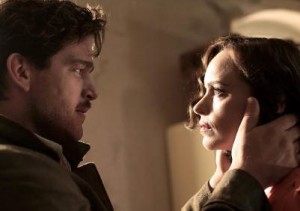 Phoenix, a new film by German director Christian Petzold, takes its name not from the Arizona city, but a nightclub catering to American GIs in postwar Berlin, with the added significance of the word’s original meaning, a mythical bird that rises from the ashes after being consumed in fire.
Phoenix, a new film by German director Christian Petzold, takes its name not from the Arizona city, but a nightclub catering to American GIs in postwar Berlin, with the added significance of the word’s original meaning, a mythical bird that rises from the ashes after being consumed in fire.
Nina Hoss plays Nelly Lenz, a concentration camp survivor whose face has been shattered by a gunshot wound. She’s brought back to Berlin by her close friend Lena to undergo facial reconstruction. Nelly, formerly a cabaret singer, wants the surgeon to make her look like she used to, but the results are not what she had hoped for. Now, her grave and devoted friend Lena, played by Nina Kunzendorf, has a plan. They will leave Germany forever and go to Palestine, where Jews are planning to create a nation of their own. But Nelly is obsessed with finding her husband Johnny, and she wanders the dangerous streets of Berlin at night looking for him. She finds him at the Phoenix nightclub, but although he’s struck by her resemblance to his wife, whom he believes is dead, he doesn’t recognize her.
As it turns out, Nelly is due to receive an inheritance, and Johnny, played by Ronald Zehrfeld, asks her to pretend to be his wife returned from the camps, so that he can receive the inheritance. In return, he will let her have part of it. In a trance-like mixture of horror and fascination, Nelly goes along with the plan, not revealing who she really is, hoping that Johnny will recognize her on his own.
The premise is of course melodramatic in the extreme—it’s based on a 1963 crime novel by Hubert Montelheit—but the elements are also reminiscent of other stories and films of disguise and revelation, including Hitchcock’s Vertigo. Petzold, however, always invests his films with social and political themes, especially the fate of a divided and later reunited Germany. The unspeakable crimes of the Third Reich have had repercussions that still haunt us today, and Petzold’s films often deal with the guilt, and especially the denial, by which Germany has unsuccessfully sought to deal with its legacy.
The time frame of Phoenix is immediately after the war, the country still reeling from shock, and the people busy trying to hide whatever complicity they may have had in the disaster. There is the possibility that Johnny was the one who betrayed his wife to the Gestapo in order to save his own skin, and the cat-and-mouse game between him and the wife he won’t recognize is emblematic of the wounded nation shrinking from its own past.
Nina Hoss has become Petzold’s regular star, and here she excels all her previous work. Her vulnerability as Nelly is almost terrifying. From time to time we hear in the nightclub the ballad “Speak Low,” a Kurt Weill song in which the singer tells her lover that it’s too late. When Hoss finally sings the song, the effect is devastating. So is Phoenix.

